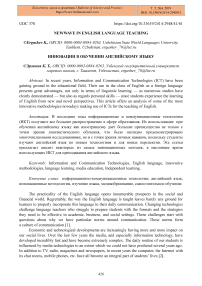New wave in English language teaching
Автор: Ergashev Kachramon
Журнал: Бюллетень науки и практики @bulletennauki
Рубрика: Педагогические науки
Статья в выпуске: 4 т.5, 2019 года.
Бесплатный доступ
In recent years, Information and Communication Technologies (ICT) have been gaining ground in the educational field. Their use in the class of English as a foreign language presents great advantages, not only in terms of linguistic learning - as numerous studies have clearly demonstrated - but also as regards personal skills - since students experience the learning of English from new and novel perspectives. This article offers an analysis of some of the most innovative methodologies nowadays making use of ICTs for the teaching of English.
Information and communication technologies, english language, innovative methodologies, language learning, media education, independent learning
Короткий адрес: https://sciup.org/14115388
IDR: 14115388 | УДК: 378 | DOI: 10.33619/2414-2948/41/61
Список литературы New wave in English language teaching
- Berge Z. L. The role of the online instructor/facilitator. http://www. emoderators.com/moderators/teach_online.html. 2009.
- Grabe and Grabe. Integrating technology for meaningful learning. Houghton Mifflin, 2014.
- Holec H. Autonomy in foreign language learning. Oxford: Oxford University Press, 2015.
- Миргиязова М. М. Innovative technologies in teaching English // Молодой ученый. 2017. №25. С. 301-302.
- Ghasemi B., Hashemi M. ICT: Newwave in English language learning/teaching // Procedia-social and behavioral sciences. 2011. V. 15. P. 3098-3102. DOI: 10.1016/j.sbspro.2011.04.252
- Kushner E. English as global language: problems, dangers, opportunities // Diogenes. 2003. V. 50. №2. P. 17-23.
- DOI: 10.1177/0392192103050002002
- Anas I., Musdariah A. Being an E-Teacher: Preparing the ESL Teacher to Teach English with Technology // Journal of English Language Teaching and Linguistics. 2018. V. 3. №1. P. 41-56.
- DOI: 10.21462/jeltl.v3i1.102
- Zhou Z. Second Language Learning in the Technology-mediated Environments // Asian Education Studies. 2018. V. 3. №1. P. 18.
- DOI: 10.20849/aes.v3i1.307
- Schwartz M., Yagmur K. Early language development and education: teachers, parents and children as agents //Language, Culture and Curriculum. 2018. V. 31. №3. P. 215-219.
- Chang S. Y. Beyond the English Box: Constructing and Communicating Knowledge Through Translingual Practices in the Higher Education Classroom // English Teaching & Learning. 2019. P. 1-18.
- DOI: 10.1007/s42321-018-0014-4
- Johnson D. C., Stephens C. Language Policy and Planning // The Palgrave Handbook of Applied Linguistics Research Methodology. Palgrave Macmillan, London, 2018. P. 811-827.
- Colpaert J. Exploration of affordances of open data for language learning and teaching // Journal of technology and Chinese language teaching. 2018. V. 9. №1. P. 1-14. http://www.tclt.us/journal/2018v9n1/colpaert.pdf.
- Kum H. A. Language-Culture: Marginalisation or Opportunity in Cameroon's official ‘state bilingualism' // Language, Identity and Symbolic Culture. 2018. P. 105.
- Jung, Y., & Lee, J. Learning engagement and persistence in massive open online courses (MOOCS) // Computers & Education. 2018.
- DOI: 10.1016/j.compedu.2018.02.013


